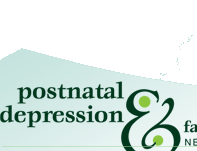 |
 |

|
|
|

Depression in pregnancyTo read the Introducton to Pregnancy Click Here SymptomsDepression can occur in pregnancy. In fact, it is probably just about as common in pregnancy as it is after delivery. It can be hard to identify depression in pregnancy because many of the symptoms overlap with the symptoms of pregnancy. This is especially so for the first 12-14 weeks of the pregnancy. Tiredness Many women become very tired during the first third or even half of their pregnancy. For many this is worse than the nausea. People dont realise this and therefore the tired, pregnant mother doesnt get the same amount of sympathy as those who are nauseated. Clinical depression can also make you feel incredibly tired so how do you tell the difference? (See below). Adjustment to pregnancy Finding out you are pregnant is not always happy news. Even when it is there can be many new worries. For first time mothers, especially it is a huge new experience affecting every dimension of your life.There are body changes, emotional changes, and changes to your work expectations and role. It also affects important relationships with your partner, friends and family/whanau. All of this can cause worries about whether you will be able to cope with the adjustments needed. Is this normal in pregnancy or is this depression?How to tell the difference:
TreatmentDepression can be treated just as effectively in pregnancy as after delivery but the issues around the use of medications are more complex. (See the sections on Treatments and Medications). The following are important
A healthy mother is the most important factor for a healthy baby. Lucys StoryLucy was in her second pregnancy. She had previously had depression and been on antidepressants. This is her story. I felt quite depressed throughout the pregnancy. I knew that it was best not to take any medication at all in pregnancy. I didnt think that I was able to take antidepressants in pregnancy. I struggled on, feeling terrible, blaming my hormones, thinking that I would just have to put up with it all.I went to my midwife for a routine check-up at about 30 weeks. I told her that I felt terrible and I did not want this baby. I felt as though I was in a black pit with no way out. I couldnt shake these feelings of despair. My midwife told me to see my doctor,who recognised that I was depressed and needed help. My doctor put me onto an antidepressant medication, which made me feel heaps better. I could start to see a way out of the black pit.Two weeks before my baby was born I got worse again. I couldnt stand my baby and felt that I wouldnt be able to cope after he was born. I remained on antidepressants after the birth and managed quite well. I am pleased that I went on antidepressants although I worried about any side-effects that it might have on my baby.
|
||||||||||||||
Home | About us | Baby | Books & Links | Contact Us | Culture | Fact Sheets | Family/Whanau | Fathers | Glossary | Medical Info | Medications | Post Natal Depression | Pregnancy | Q&A | Related Conditions | Stories | Support | Treatments |


